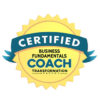In general, any business can start as a sole proprietorship or a partnership (especially in the life coaching or similar fields) and it can stay like this unless your business needs change and you decide to choose another legal structure.
A sole proprietorship is a one-owner business type and is the simplest and least costly way to structure your business. Any one-person business that has not filed papers to become a corporation or an LLC, is a sole proprietorship. There are no forms to file and no other requirements to have your business function as a sole proprietorship. However, because it is a business, in a sole proprietorship there are a few rules:
- It’s possible that your local governments, like the city or county, may require you to obtain a local tax registration, a license or a permit, or it may regulate what kind of signage you may display for your business. It is not necessary for these regulatory details to be viewed as part of the process of starting a sole proprietorship, because in essence, there is no such process. A sole proprietorship is the default legal status for any solo person who engages in business.
– all profits go directly to the owner
– ownership must be limited to a single owner or a married couple
– taxable income is subject to both income and self-employment tax
The major disadvantage to a sole proprietorship is that all legal and financial obligations incurred by the company are passed directly to the owner. In other words, if your company gets sued for any reason, you are personally responsible for answering the lawsuit; you have unlimited liability for your business’s debts. Mistakes can cost you, not only the company, but possibly everything you own, depending on the laws of the state in which you reside.
For example, in Florida, they cannot come after your primary residence, but in other states or countries, this may be different. Because of the personal risks involved with a sole proprietorship, Liability insurance is strongly recommended. It’s recommended in all business legal entities, but especially for sole proprietors. Because, if you are coach and for some reason one of your clients decides to sue you, it’s important that they cannot come after your personal properties or assets that are not even related to the business.
On the other hand, the benefit of a sole proprietorship is that it’s easy to close and walk away, assuming that there are no outstanding creditors to be paid. Sole proprietorships are the most popular form of legal structure in the United States, with approximately 3/4 of all businesses in America being sole proprietorships. If you are a freelance photographer or a writer, a craftsperson, a personal consultants or a contractor and you have not filed papers to create an LLC or a corporation, you are automatically a sole proprietor. It makes no difference if you have a day job or not. This comes as a surprise to people such as fitness instructors, life coaches or even a musician who plays paid gigs every month or so. Many people who have side gigs who don’t see themselves as self-employed or business owners. What is clear is, as long as you do for profit work on your own, you are so proprietor. Sole proprietors can hire employees or independent contractors just like any other business type.
If you choose to structure your entity, at least at first, as a sole proprietorship, there are a few things to mention:
1. Do not ignore local registration requirements and rules
you may not need to do much from a legal perspective to register your sole proprietorship, however in the United States most cities and many counties require businesses, even tiny home-based sole proprietorships, to register with them and pay at least a minimum tax or fee. If you do business under a name different from your own legal name, known as the DBA, doing business as, this name has to be registered with your county. To be honest, I know many small businesses that ignore these requirements, without consequences so far, however, keep in mind that if you are caught you may be subject to back taxes and fees, and other penalties. Also skipping these formalities may result in other problems like not being able to open a business bank account.
2. Be aware of taxation and liability issues
in the eyes of the law, a sole proprietorship is not legally separated from the person who owns it, and like we said, this is the one fundamental difference between a sole proprietorship and a corporation or LLC. The two major effects are; one related to taxes and one related to personal liability.
Author: Sanda Kruger
Sanda is an entrepreneur, real estate investor, health coach and professional dancer. Sanda is an entrepreneur with more than 20-year experience in business development and project management in the fields of life, health and fitness coaching. She is also a real estate investor and a banker, who learned outstanding adapted business strategies, sales and marketing techniques, communication, and goal setting skills, hands-on, through life and work experiences. She is a certified fitness professional and is the creator of two original fitness programs, called BellyCore® Fitness and AquaCor®.
If you want to dive deeper into the EVERYTHING you need to know about starting a life coaching business, check out the following 3 self-paced online courses!

STARTUP 101
Take this free article series you are reading now further and learn more about taxes, accounting, creating a business plan, startup costs, funding, and more!
Save 50% with coupon code: STARTUPBLOG

BUSINESS FUNDAMENTALS
LIFE COACH CERTIFICATION
Want to guide other entrepreneurs through this startup process? Get CERTIFIED and trained to use all of the content in the Startup 101 course above PLUS a ton more content on goal setting, business mindset, marketing and advertising, too!
Save 50% with coupon code: STARTUPBLOG

LIFE COACHING
BUSINESS MASTERCLASS
Get your COACHING OFFER ready to launch! This course will guide you through choosing a niche, creating a signature coaching package, and the marketing strategies that have been proven to be most effective for life coaches
(joint ventures, free sessions, and speaking).
(Learn more first with this free video series)
Save 50% with coupon code: STARTUPBLOG







